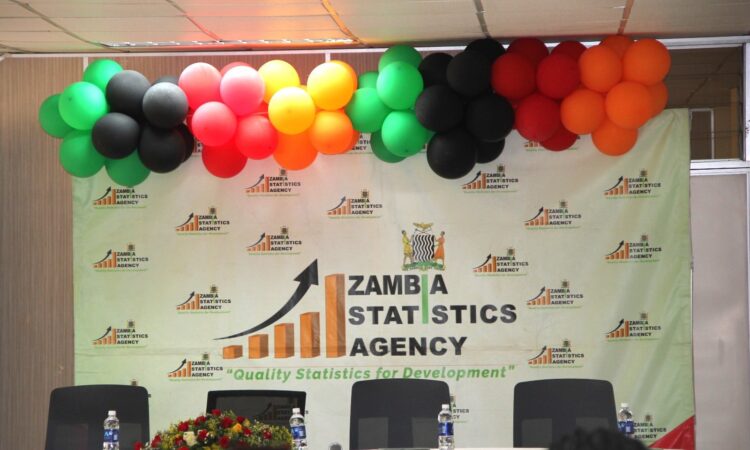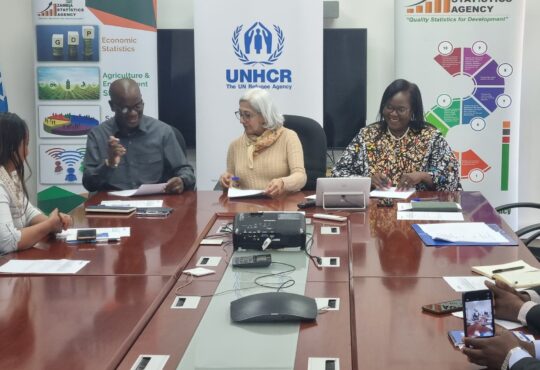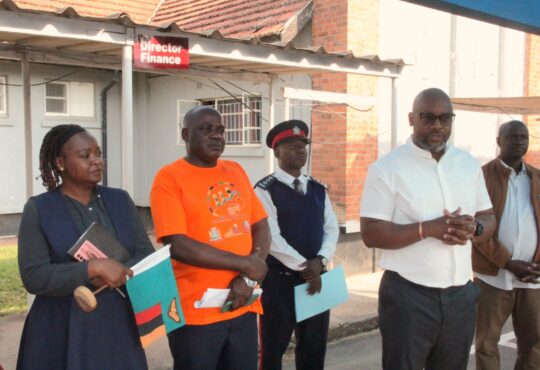A HISTORIC MILESTONE FOR ZAMBIA; ZAMSTATS LAUNCHES IT’S FIRST NATIONAL DATA SCIENCE TRAINING HUB

The Zambia Statistics Agency (ZamStats) officially launched the National Data Science Hub, a game-changer in advancing data-driven innovation and development for Zambia. The launch was graced by Ms. Prudence Kaoma, Permanent Secretary for Planning and Administration in the Ministry of Finance and National Planning.
Among other key dignitaries who attended the launch were the Swedish Ambassador to Zambia, His Excellency, Mr. Johann Hallenborg and Mr. Andreas Pletziger, Chargé d’Affaires and Head of Cooperation of the German Embassy and ZamStats Board Chairperson Mr. Oliver Chinganya.
ZamStats has been proactive in repositioning itself as a central coordinating Agency within the NSS. A key step in this journey has been implementation of the ZamStats-Statistics Sweden Cooperation Project (2019-2025), Phase1, supported by the Swedish International Development Cooperation Agency (SIDA).
This partnership, now moving onto Phase 2 (2025-2028) has significantly strengthened institutional capabilities, particularly in areas of coordination, data quality management and environmental and climate statistics. Among the milestones achieved is the establishment of the National Science Training Data Hub. The German Government (GIZ) has also supported the establishment of the Hub with computers that will be used during trainings.
Speaking during the launch, the Permanent Secretary emphasized that the launch of the National Data Science Training Hub marks a transformative milestone for ZamStats and the entire National Statistical System (NSS), as this will contribute to the production of better data which translates to better decision making for the country.
Ms. Kaoma also stated that the Hub was fully aligned with Zambia’s national priorities and legal frameworks, including the Statistics Act No. 13 of 2018 and the 8th National Development Plan.
“It reinforces our collective drive towards achieving Vision 2030 which is to transform Zambia into a prosperous, middle-income nation. By placing data and information at the heart of national development, the Hub will modernize the way government collects, manages, and uses data, ensuring smarter governance and more impactful development outcomes”, Ms. Kaoma stated.
ZamStats Board Chairperson, Mr. Oliver Chinganya described the launch of the hub as a significant milestone in Zambia’s journey to modernize its statistical system and harness the power of data for national development. He added that the establishment of the Hub fully aligns with the ZamStats Strategic Plan (2025–2026) and the Second National Strategy for the Development of Statistics (2023–2027), reinforcing the country’s commitment to building a robust, future-ready statistical system.
“The Hub is not merely a physical facility but a strategic engine for advancing evidence-based decision-making and for transforming ZamStats into a modern, innovative institution, capable of delivering timely, disaggregated, and high-quality data,” The Board Chairperson said.
Speaking during the launch, the Acting Statistician General Mrs. Sheila S. Mudenda explained the purpose of establishing the Hub, highlighting how it would primarily focus on building skills among various players of the National Statistical Office (NSS).
She indicated that the institution will deliver short-term courses, ranging from data management and liberalizations to the basics of machine learning, tailored for statisticians, planners, and analysts across government and the wider NSS.
Mrs. Mudenda further explained that the Hub will promote standards and quality, with every program aligned to the Code of Practice to reinforce common methods.
“In addition, the Hub is intended to foster collaborations and sustainability, being open to regional peers, leveraging local universities and professional societies, and drawing on the expertise of retired specialists to ensure that institutional memory is preserved and strengthened” Mrs Mudenda said.
“Our ambition is for the Hub to become a center of technical excellence, supporting continuous skills development, encouraging innovations and generating practical solution to real policy solutions. Overtime we will grow accredited courses, establish mentoring network and income generating service that make the hub self-sustaining,” she retaliated.
Speaking during the Launch, the Swedish Ambassador to Zambia, His Excellency, Mr. Johann Hallenborg, congratulated ZamStats and all partners involved to achieve this. The ambassador said that the training Hub was a milestone that reflected Zambia’s strong commitment to evidence-based policy making, institutional capacity and to the development of Zambia. He further stated that Sweden was a key partner in supporting ZamStats in its journey to become a strategic institution, one that not only produces high quality statistics, but also coordinates and builds capacity across the national statistical system.
“This role is vital for ensuring that data is not only collected but also used effectively to inform policies and drive development. The Launch of the Data Science Training Hub is not just about infrastructure- It is about investing in people as it will be used to deliver in service statistics training programmes which are essential for continuous learning and professional development”, he stated.
Mr. Andreas Pletziger, Chargé d’Affaires and Head of Cooperation of the German Embassy stated that the German Federal Ministry for Economic Cooperation and Development, through its technical cooperation agency GIZ and with co-funding from the European Commission, was proud to stand alongside Zambia in advancing data-driven development.
“Today we see very concrete evidence of this partnership: Germany has provided 35 state-of-the-art all-in-one desktop computers, equipped with licensed software such as STATA and SPSS, to ensure that this hub is not only a vision, but a fully functional centre of excellence.
“These computers are more than hardware; there are the backbone of the hub’s ability to train statisticians, analyse data, and deliver insights that will shape Zambia’s future. It is important because reliable data is the foundation of good governance and decision making. With accurate and timely statistics, Zambia can design policies that respond to real needs, allocate resources where they are most effective, and monitor progress towards national and global development goals”. Mr. Pletziger said.
The Acting Statistician General expressed gratitude to the Guest of Honor, Prudence Kaoma, PS, Diplomatic partners from Sweden and Germany, the ZamStats Board Chairperson, the Board members present for their steadfast and unwavering support. She also acknowledged the dedication of ZamStats staff and extended thanks to colleagues across the National Statistical System (NSS).






